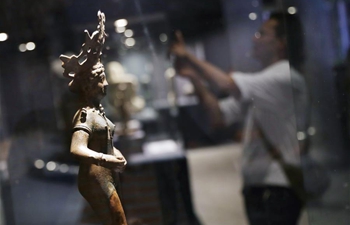By Ndalimpinga Iita
WINDHOEK, Sept. 1 (Xinhua) -- Hair trade is burgeoning amongst youth in Namibia's capital Windhoek amid job losses, and as unemployment levels surge.
Records by Namibia Statistics Agency shows that unemployment of Namibians between the ages of 15 and 34 years has increased from 43.4 percent recorded in 2016 to 46.1 percent by the end of 2018.
Selma Ndapwa worked at a local retail shop until business dwindled following an economic downturn, and she was retrenched from work early this year.
With no formal higher education, job hunting embittered her.
After an unsuccessful search for another job, the 28-year-old woman turned to hairdressing at Havana informal settlement on the outskirts of Windhoek.
In June this year, she joined an existing salon along the slum's main road, where she rented a chair as space for her clients.
She learned hairdressing skills growing up in her village in the northern part of Namibia, a skill she took casually. Hitting rock-bottom, she diverted the casual talent into a vocation.
After impressing her fifth client, news about her distinct hairdressing skills spread.
"Although the business started slowly, it gradually picked up when I built a client base through referrals," Ndapwa said.
From earning a meager 800 to 1200 Namibian dollars(53 to 79 U.S. dollars) monthly, today, she makes an average 5000 Namibian dollars(329 U.S. dollars) and even up to 8500 Namibian dollars(559 U.S. dollars) on a good month.
"With the money, I can support my child and family and meet household needs," she said.
She is not looking back and has no plan to return to the retail sector.
"The money I earn now is triple the 1700 Namibian dollars monthly income once earned at the retail shop," she said.
She has since saved money to expand services.
"I set up my salon structure at Havana, made out of corrugated iron to offer clients better services and have my own space for business," she added.
The informal sector is, however, getting competitive, and the market is a demand-supply oriented.
To address that, she has also since formed a partnership to complement and strengthen the establishment.
Her partner, Kali Sheeta, lost her job during 2018 in the construction industry and has been job hunting.
Thwarted by the not-so prospective employment opportunities, Sheeta turned to hairdressing and beauty such as nail curation to earn an income.
From scratch, she worked on a mobile basis, doing people's hair and nails from their homes.
Now commercial and business savvy, she was seeking to expand her business.
"I wanted to be stationary. That way, I will be able to manage time and set up effectively," she added.
For Sheeta, the expansion and merger are set to foster business into prosperity.
"Business was not always profitable. There are one too many salons offering the same thing. We wanted to be different. Hence the partnership to create a niche," said Ndapwa.
Martin David, constituency councilor of the area, observed that more people have turned to informal business as jobless soar, with populace left to forage for themselves.
Meanwhile, social media has been instrumental in marketing their products.
"We also make use of social media pages to promote the business," she said.
Erastus Uutoni, Minister of Sport, Youth and National Service said entrepreneurial efforts by dwellers addresses the surging unemployment level, vital for national development.
In the interim, the young entrepreneurs hope the economy recovers soon, to create a conducive environment for business.
However, the Bank of Namibia in its economic outlook report released this week, indicated that the country's economy is expected to shrink, falling into a deeper contraction during 2019, before returning to positive growth in 2020.













